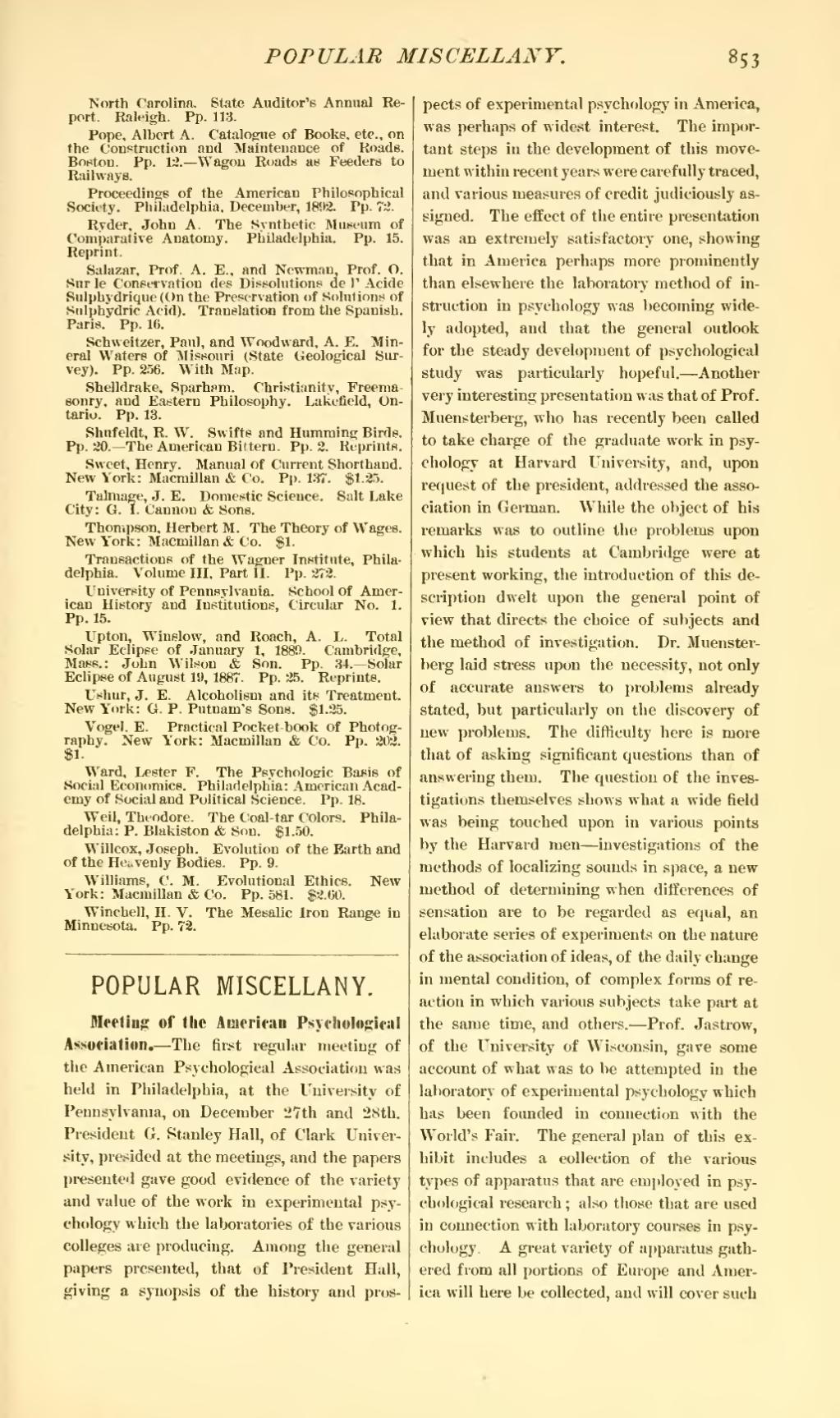North Carolina. State Auditor's Annual Report. Raleigh. Pp. 113.
Pope, Albert A. Catalogue of Books, etc., on the Construction and Maintenance of Roads. Boston. Pp. 13.—Wagon Roads as Feeders to Railways.
Proceedings of the American Philosophical Society. Philadelphia, December, 1892. Pp. 72.
Ryder, John A. The Synthetic Museum of Comparative Anatomy. Philadelphia. Pp. 15. Reprint.
Salazar, Prof. A. E., and Newman, Prof. O. Sur le Conservation des Dissolutions de l'Acide Sulphydrique (On the Preservation of Solutions of Sulphydric Acid). Translation from the Spanish. Paris. Pp. 16.
Schweitzer, Paul, and Woodward, A. E. Mineral Waters of Missouri (State Geological Survey). Pp. 256. With Map.
Shelldrake, Sparham. Christianity, Freemasonry, and Eastern Philosophy. Lakefield, Ontario. Pp. 13.
Shufeldt, R. W. Swifts and Humming Birds. Pp. 30.—The American Bittern. Pp. 2. Reprints.
Sweet, Henry. Manual of Current Shorthand. New York: Macmillan & Co. Pp. 137. $1.25.
Talmage, J. E. Domestic Science. Salt Lake City: G. I. Cannon & Sons.
Thompson. Herbert M. The Theory of Wages. New York: Macmillan & Co. $1.
Transactions of the Wagner Institute, Philadelphia. Volume III, Part II. Pp. 272.
University of Pennsylvania. School of American History and Institutions, Circular No. 1. Pp. 15.
Upton, Winslow, and Roach, A. L. Total Solar Eclipse of January 1, 1880. Cambridge, Mass.: John Wilson & Son. Pp. 34.—Solar Eclipse of August 19, 1887. Pp. 25. Reprints.
Ushur, J. E. Alcoholism and its Treatment. New York: G. P. Putnam's Sons. $1.25.
Vogel, E. Practical Pocket-book of Photography. New York: Macmillan & Co. Pp. 202. $1.
Ward, Lester F. The Psychologic Basis of Social Economics. Philadelphia: American Academy of Social and Political Science. Pp. 18.
Weil, Theodore. The Coal-tar Colors. Philadelphia: P. Blakiston & Son. $1.50.
Willcox, Joseph. Evolution of the Earth and of the Heavenly Bodies. Pp. 9.
Williams, C. M. Evolutional Ethics. New York: Macmillan & Co. Pp. 581. $3.60.
Winchell, H. V. The Mesalic Iron Range in Minnesota. Pp. 72.
POPULAR MISCELLANY.
Meeting of the American Psychological Association.—The first regular meeting of the American Psychological Association was held in Philadelphia, at the University of Pennsylvania, on December 27th and 28th. President G. Stanley Hall, of Clark University, presided at the meetings, and the papers presented gave good evidence of the variety and value of the work in experimental psychology which the laboratories of the various colleges are producing. Among the general papers presented, that of President Hall, giving a synopsis of the history and prospects of experimental psychology in America, was perhaps of widest interest. The important steps in the development of this movement within recent years were carefully traced, and various measures of credit judiciously assigned. The effect of the entire presentation was an extremely satisfactory one, showing that in America perhaps more prominently than elsewhere the laboratory method of instruction in psychology was becoming widely adopted, and that the general outlook for the steady development of psychological study was particularly hopeful.—Another very interesting presentation was that of Prof. Muensterberg, who has recently been called to take charge of the graduate work in psychology at Harvard University, and, upon request of the president, addressed the association in German. While the object of his remarks was to outline the problems upon which his students at Cambridge were at present working, the introduction of this description dwelt upon the general point of view that directs the choice of subjects and the method of investigation. Dr. Muensterberg laid stress upon the necessity, not only of accurate answers to problems already stated, but particularly on the discovery of new problems. The difficulty here is more that of asking significant questions than of answering them. The question of the investigations themselves shows what a wide field was being touched upon in various points by the Harvard men—investigations of the methods of localizing sounds in space, a new method of determining when differences of sensation are to be regarded as equal, an elaborate series of experiments on the nature of the association of ideas, of the daily change in mental condition, of complex forms of reaction in which various subjects take part at the same time, and others.—Prof. Jastrow, of the University of Wisconsin, gave some account of what was to be attempted in the laboratory of experimental psychology which has been founded in connection with the World's Fair. The general plan of this exhibit includes a collection of the various types of apparatus that are employed in psychological research; also those that are used in connection with laboratory courses in psychology. A great variety of apparatus gathered from all portions of Europe and America will here be collected, and will cover such

